As a member of the Green Livelihoods Alliance, Milieudefensie plays an active role outside the Netherlands protecting tropical forests and the indigenous people who depend on them. Here is an overview of our success stories in Ghana, Togo, Cameroon, Liberia and Indonesia.
Green Livelihoods Alliance
The Green Livelihoods Alliance (GLA) is a partnership between Milieudefensie, Gaia Amazonas, IUCN NL, NTFP-EP, SDI Liberia and Tropenbos International. The GLA works to protect tropical forests and the people who depend on them. Within this context, Milieudefensie is working together with partner organisations in Africa, Southeast Asia, and South America on sustainable and inclusive management of tropical forests; combatting deforestation, human rights abuses and dangerous climate change. And safeguarding the livelihoods of the local population.
The GLA protects tropical forests in Bolivia, the Democratic Republic of Congo, Cameroon, Colombia, Ghana, Indonesia, Liberia, Malaysia, the Philippines, Uganda and Vietnam.
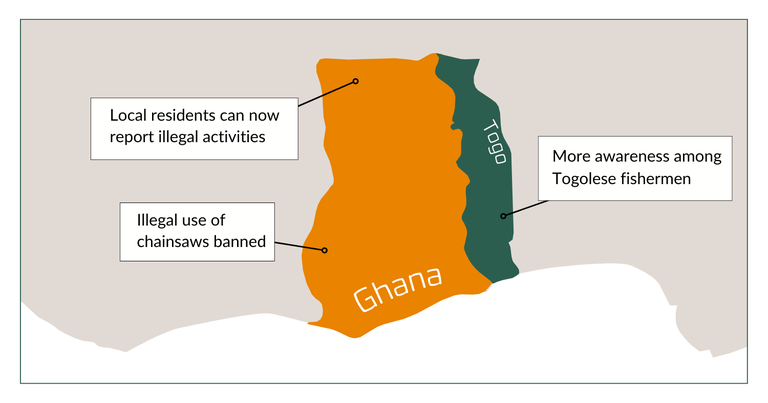
Local inhabitants report illegal activities
Thanks to our lobbying work at the Forestry Commission of Ghana, local inhabitants and civil society organisations can now call people to account for illegal logging and mining operations. The reporting of such abuses means the Forestry Commission is better able to tackle this problem. The Forestry Commission is responsible for the regulation of the conservation and sustainable utilisation of forests in Ghana. The Committee is part of the Ghanese Ministry of Lands and Natural Resources.
Illegal chainsaw use eradicated
Kramokrom is a community on the fringe of the Bia Tributaries North Forest Reserve in Ghana, where illegal logging had increased considerably in recent years. Use of the Timby app has reduced the illegal use of chainsaws from four days a week to nul. Timby – which stands for This Is My Backyard – is a mobile app for gathering information om illegal logging, for monitoring forest areas and for sharing information with others such as government authorities. Our GLA partner Friends of the Earth Ghana provided training on how to use the app.
Awareness among Togolese fishers
Oil and gas extraction on the coast of Togo has an extremely negative impact on the lives of fishermen there. Our GLA partner Friends of the Earth Togo has been making fishing communities aware of the harmful effects of this polluting industry, by, for example, conducting research. Milieudefensie provided support for this.
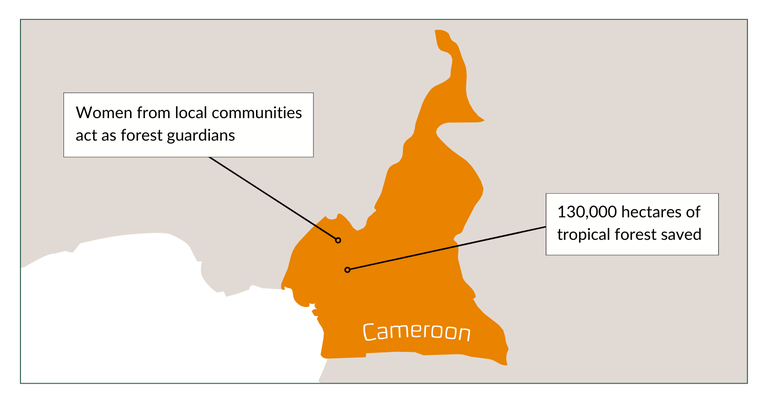
Women from local communities act as forest guardians
Inequality between men and women and violence against women are commonplace in Cameroon. Following a gender training course given by Milieudefensie partner CED (Friends of the Earth Cameroon), groups of women came together to be stronger as they tackle rape, violence and land grabbing. To help women overcome cultural barriers and safety barriers in forest monitoring, a new strategy was tried out which proved a success: women from local comunities are now acting as forest guardians.
130,000 hectares of forest saved from logging
More than 130,000 hectares (321,000 acres) of tropical forest has been provisionally saved from logging, and that is good news for the poeple who are dependent on the invaluable Ebo Forest. Together with Friends of the Earth Cameroon, we kept putting pressure on the Cameroonian government. This has ensured that this tropical forest is not being turned into an industrial logging area.
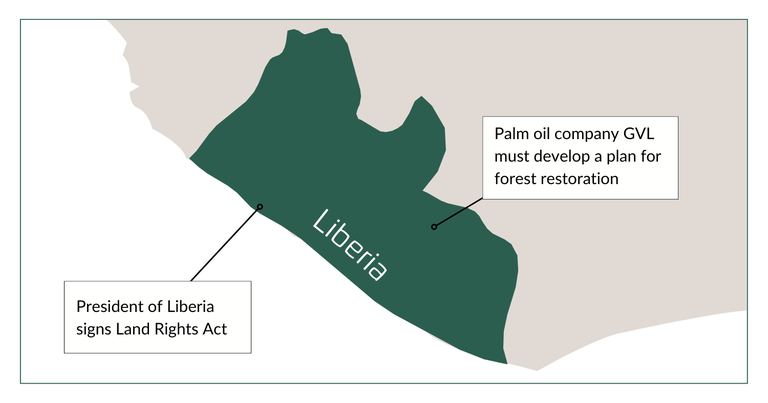
President of Liberia signs Land Rights Act
The Land Rights Act is the new land legislation in Liberia that sets down customary land rights for communities. This means that communities, families and individuals have more control of their natural resources. The act is the first of its kind in Africa.
Palm oil company forced to restore forest
Thanks to our efforts, the palm oil company Golden Veroleum Liberia (GVL) has been held liable for the felling of tropical forests. GVL has been under fire since 2012 for gross human rights abuses and environmental pollution. Back then we spent days surveying the plantations on foot with GPS, accurately measuring the devastation caused by deforestation. The verdict from the international complaint proceedings was clear: GVL is obliged to restore the forest and is currently developing a plan for this.
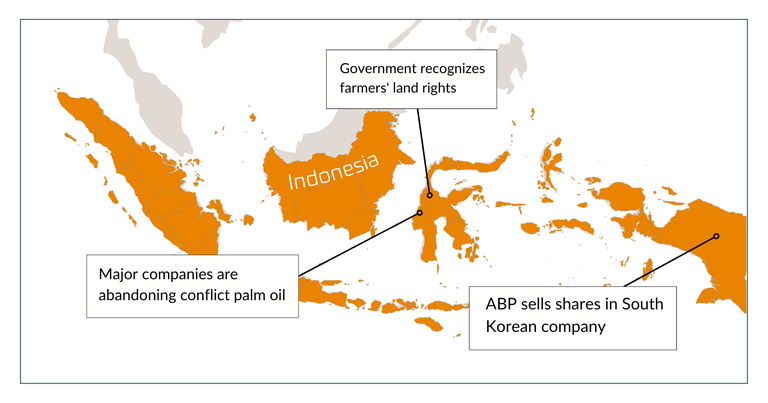
Government recognises farmers’ land rights
GLA partner WALHI (Friends of the Earth Indonesia) provides legal support to communities that oppose industrial palm oil plantations. It is also committed to stringent law enforcement. This has resulted in governmental recognition of the land rights of a particular group of farmers, enabling them to protect their own forest.
Multinationals reject dubious palm oil
The Indonesian palm oil company Astra Agro Lestari (AAL) is involved in land grabbing, violence against farmers and deforestation. WALHI and Milieudefensie have helped to bring these highly controversial practices to light, as a result of which major companies such as Nestlé, Danone, FrieslandCampina, PepsiCo and PFZW have withdrawn as buyers or financers of AAL’s palm oil. It seems the time has passed that large and wealthy companies can get away with human rights abuses and damaging the climate.
ABP sells shares in South Korean company
ABP invests heavily in companies that are involved in land grabbing, deforestation and human rights abuses. However, in the summer of 2018 it took a step in the right direction: following pressure from Milieudefensie and large-scale protests from ABP’s own customers, the largest pension fund in the Netherlands is withdrawing its investments in POSCO DAEWOO. This is the largest trading company in South Korea, owner of such companies as PT Bio Inti Agrindo (PT BIA). And PT BIA has destroyed huge areas of rain forest in the Indonesian province of Papua in order to establish a giant oil palm plantation.
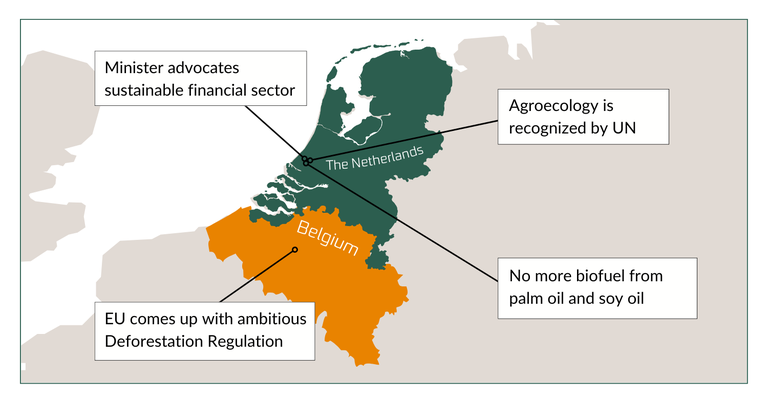
Minister calls for sustainable financial sector in Europe
No fewer than 32,000 people signed our appeal to the Dutch government for binding regulations for financial institutions such as banks and pension funds, aimed at prohibiting investments involving deforestation and human rights abuses. The appeal was successful, as it led to a call from the Dutch Minister of Finance for a sustainable financial sector in Europe.
Agroecology recogised by UN
The United Nations Food and Agriculture Council has adopted 10 principles of agroecology, thus demonstrating its recognition of the value of agroecology. Agroecology is a approach to sustainable agriculture in which optimum use is made of natural resources without causing damage. We achieved this result through intensive lobbying.
Historic EU law on deforestation
Commodities from large European companies are major contributers to global deforestation. An historic EU deforestation-free law aims to tackle this issue. This legislation is intended to prevent companies from causing deforestation in the production of palm oil, cattle, soy, coffee, cocoa, timber and rubber and their derivatives. A milestone in the fight against deforestation! Milieudefensie has spent many years fighting alongside other civil society organisations for strong anti-deforestation legislation.
No more biofuel from palm and soybean oil
Soybean and oil palm plantations lead to the deforestation of tropical forests. This makes biofuels made from these products two to three times worse for the planet than fossil fuels. People who depend on the tropical forest for their livelihood are driven from their land and the habitats of the jaguar and endangered orang-utang are growing ever smaller. Milieudefensie campaigned against these biofuels, among other things via an open letter to the Dutch government which was signed by 32,702 people. Shortly after this, the Dutch House of Representatives passed a law prohibiting the use of biofuels made from palm and soybean oil. And that is fantastic news for people, forests and the climate!
Photo above: A Cameroonian woman washing her hands in a river. © Micha Patault
Our website uses cookies to ensure the use and functionality of this website. Read more about our cookie policy